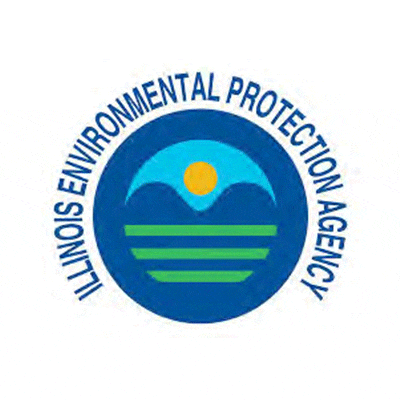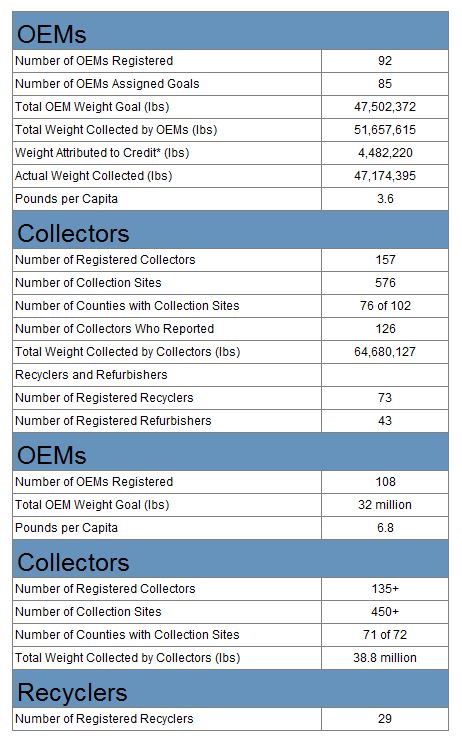Illinois:
 Illinois Third Annual E-Waste Summit
Illinois Third Annual E-Waste Summit
On April 29 the Illinois Counties Solid Waste Management Association (ILCSWMA) hosted the third Annual E-Waste Summit on behalf of the Illinois Environmental Protection Agency (IEPA) to discuss the progress of implementation of the state’s Electronic Products Recycling and Reuse Act and plans for the future. Dave Walters, manager of the waste reduction and compliance section of the IEPA, gave a presentation summing up results from 2013 and goals for 2014.
2013 Results
Illinois law states that Original Equipment Manufacturers (OEMs) will be charged $0.70 per pound if 60 percent of their assigned goal to collect covered and eligible electronic devices from Illinois consumers is not met. In 2013, the statewide OEM obligation was 47,502,372 pounds and all OEMs met or exceeded their assigned goal except for one who decided to only meet 60 percent of the goal. Under the law this action was legal and the OEM did not face any penalties. There was discussion among audience members, who were largely county and municipal recycling coordinators, about working to eliminate this loophole in the law in the future. Four OEMs were fined a total of $12,697 for not meeting specific administrative requirements under the law.
[one_half_last]Conversely, registered collectors reported collecting 65,680,127 pounds of covered and eligible electronic devices which was 37 percent more than what OEMs actually collected. Walters attributed this difference to double reporting by collectors and recyclers and the inclusion of business and institutional equipment in collector reports. Some audience members put forth comments that perhaps some of it is also from more material being collected than OEMs are responsible to collect and recycle or OEM obligations (50 percent of market share) being too low.
Under the law, the IEPA distributes $2,000 in public education grants to counties that apply. In 2013, only 47 of 102 counties applied for the grants. It was suggested by a member of the audience that since the county response rate was so low and the per county grant amount small, that it might make more sense if the IEPA pooled the money and did a statewide education campaign in the future instead. Only 30 counties applied for the grant in 2014.
[/one_half_last]
2014 Goals & Results
The total statewide OEM obligation for 2014, the fifth year of the law’s implementation is 42,230,454 pounds. To date, 96 OEMs have registered with the state and 86 have been assigned goals.
Potential Legislative Changes
The IEPA is required to solicit public input and submit a report with suggested modifications to the law to the Illinois Legislature and Governor by February 1, 2016. They are required to solicit input from stakeholders and the public (via written comments and hearing) by August 1, 2015 and seek additional comments by October 1, 2015. The final report is supposed to assess the:
- Sufficiency of the recycling goals
- Adequacy of OEM credits
- Adequacy of penalties
- Adequacy of collection systems
A copy of Walters’ presentation can be found on the ILSCWMA website.
Wisconsin:
 2014 E-Cycle Wisconsin Stakeholder Meeting
2014 E-Cycle Wisconsin Stakeholder Meeting
On May 7 Sims attended the Wisconsin Department of Natural Resources’ (WDNR) first E-Cycle Wisconsin stakeholder meeting in Madison, Wisconsin where discussions were had regarding the progress of the state’s take back law to date and potential policy changes coming in the future either via rule-making or legislation. While no OEM representatives were present, the meeting was well attended by a good mix of collectors, recyclers, and county and municipal recycling coordinators.
The majority of stakeholders present expressed they felt that the law, now in its fifth year of implementation, was working to serve its intended purpose and there were only a few recurring complaints or suggested changes. Below is an overview of progress under the law during the 2012-13 program year and potential legislative changes the WDNR may push for in the future.
2012-2013 Program Year
In program year 2012-2013, all affected OEMs met their obligation either through direct collection programs or payment of shortfall fees to the WDNR. The WDNR received $10,105 in shortfall fees from 15 OEMs. 12 OEMs with small obligations paid shortfall fees for their full obligation.
Suggested Policy Changes
The WDNR has to submit an annual report to the Governor every December regarding progress of the law and recommend changes if necessary. Recommendations the WDNR is considering include:
- Reducing or eliminating registration fees for small manufacturers.
- Changing OEM and recycler reporting requirements to include five product types versus the one category (all eligible electronic devices or EEDs) required now. The five categories are televisions, monitors, computers, printers and other.
- Creating a limited grant program to help fund rural collection efforts.
- Adding all K-12 private schools (not just Parental Choice Program schools) as covered entities under the program.
- Expanding the list of covered electronic devices (CEDs) to increase the annual OEM target weight either by classifying EEDs as CEDs and/or adding new devices such as game consoles and cell phones to the CED category. Changing the
- OEM obligation formula is also under consideration. Collection numbers are outpacing OEM obligation targets every year while obligation targets continue to decrease annually because new devices are weighing less.
- Eliminating the rural collection incentive.
Presentations from the stakeholder meeting and more detail about annual program results can be found on the WDNR website.

